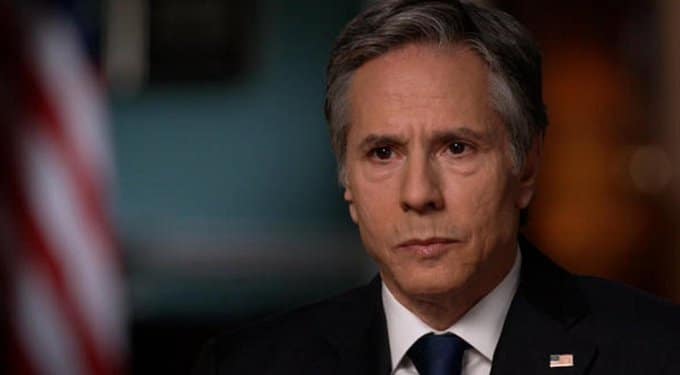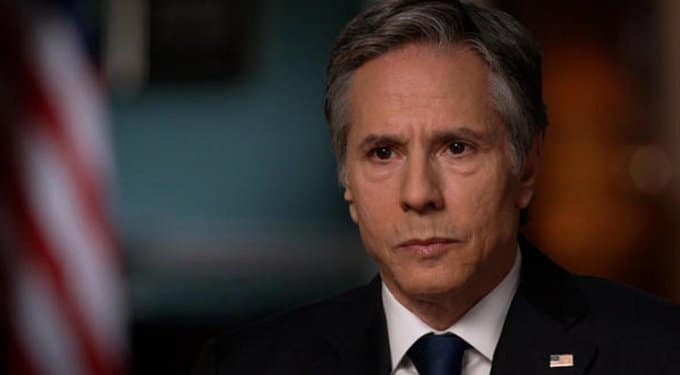
With the exception of the impending departure of US and NATO forces from Afghanistan, if it occurs, the White House seems to prefer to use aggression to deter adversaries rather than finesse. The recent exchanges between Secretary of State Tony Blinken and Chinese Foreign Minister Wang Yi at a meeting in Alaska demonstrate how Beijing has a clear view of its interests which Washington seems to lack. Blinken initiated the acrimonious exchange when he cited “deep concerns with actions by China, including in Xinjiang, Hong Kong, Taiwan, cyber attacks on the United States, economic coercion toward our allies. Each of these actions threaten the rules-based order that maintains global stability. That’s why they’re not merely internal matters, and why we feel an obligation to raise these issues here today.” He then threatened “I said that the United States relationship with China will be competitive where it should be, collaborative where it can be, adversarial where it must be” before adding “I’m hearing deep satisfaction that the United States is back, that we’re reengaged with our allies and partners. I’m also hearing deep concern about some of the actions your government is taking.”
The Chinese Foreign Minister responded sharply, rejecting US suggestions that it has a right to interfere in another country’s domestic policies, “I think we thought too well of the United States, we thought that the US side will follow the necessary diplomatic protocols. The United States does not have the qualification to say that it wants to speak to China from a position of strength. We believe that it is important for the United States to change its own image, and to stop advancing its own democracy in the rest of the world.” Yi had a point. Ironically, most of the world believes that the US represents a greater threat to genuine democracy than does either China or Russia.
In another more recent interview Blinken has accused the Chinese of acting “more aggressively abroad” while President Biden has claimed that Beijing has a plan to replace America as the world’s leading economic and military power. US United Nations envoy Linda Thomas-Greenfield has also delivered the same message that Washington is preparing to take no prisoners, pledging to push back against what she called China’s “authoritarian agenda” through the various agencies that make up the UN bureaucracy. Indeed, the United States seems trapped in its own rhetoric, finding itself in the middle of a situation with China and Taiwan where warnings that Beijing is preparing to use force to recover its former province leave Washington with few options to support a de facto ally. Peter Beinart in a recent op-ed observes how the White House has been incrementally increasing its diplomatic ties with Taiwan even as it both declares itself “rock solid” on defending while also maintaining “strategic ambiguity.”
China understands its interests while the US continues to be bewildered by Beijing’s successful building of trade alliances worldwide. Meanwhile Russian President Vladimir Putin, reputedly an excellent chess player, is able to think about genuine issues in three dimensions and is always at least four moves ahead of where Biden and his advisers are at any time. Biden public and video appearances frequently seem to be improvisations as he goes along guided by his teleprompter while Putin is able to explain issues clearly, apparently even in English.
A large part of Biden’s problem vis-à-vis both China and Russia is that he has inherited a US Establishment view of foreign and national security policy options. It is based on three basic principles. First, that America is the only superpower and can either ignore or comfortably overcome the objections of other nations to what it is doing. Second, an all-powerful and fully resourced United States can apply “extreme pressure” to recalcitrant foreign governments and those regimes will eventually submit and comply with Washington’s wishes. And third, America has a widely accepted leadership role of the so-called “free world” which will mean that any decision made in Washington will immediately be endorsed by a large number of other nations, giving legitimacy to US actions worldwide.
What Joe Biden actually thinks is, of course, unknown though he has a history of reflexively supporting an assertive and even belligerent foreign policy during his many years in Congress. Kamala Harris, who many believe will be succeeding Biden before too long, appears to have no definitive views at all beyond the usual Democratic Party cant of spreading “democracy” and being strong on Israel. That suggests that the real shaping of policy is coming from the apparatchik and donor levels in the party, to include the neocon-lite Zionist triumvirate at the State Department consisting of Tony Blinken, Wendy Sherman and Victoria Kagan as well as the upper-level bureaucracies at the Pentagon and intelligence agencies, which all support an assertive and also interventionist foreign policy to keep Americans “safe” while also increasing their budgets annually. Such thinking leaves little room for genuine national interests to surface.
Biden’s Secretary of State Tony Blinken is, for example, the perfect conformist bureaucrat, shaping his own views around established thinking and creating caveats to provide the Democratic Party leadership with some, though limited, options. Witness for example the current White House attitude towards Iran, which is regarded, along with Russia, as a permanent enemy of the United States. President Biden has expressed his interest in renegotiating a non-nuclear proliferation treaty with the Iranians, now being discussed by diplomats without direct contact in Austria. But Blinken undercuts that intention by wrapping the talks in with other issues that are intended to satisfy the Israelis and their friends in Congress that will make progress unlikely if not impossible. They include eliminating Iran’s alleged role as a regional trouble maker and also ending the ballistic missile development programs currently engaged in by the regime. The downside to all of this is that having a multilateral agreement to limit Iranian enhancement of uranium up to a bomb-making level is very much in the US interest, but it appears to be secondary to other politically motivated side discussions which will derail the process.
A foreign and national security policy based on political dogma rather than genuine interests can obviously generate some disconnects, unlike in Russia or China, where redlines and national interests are clearly understood and acted upon. To cite yet another dangerous example of playing with fire that one is witnessing in Eastern Europe, the simple understanding that for Russia Belarus and Ukraine are frontline states that could pose existential threats to Moscow if they were to move closer to the west and join NATO appears to be lacking. The US prefers to stand the question on its head and claims that the real issue is “spreading democracy,” which it is not. Policy makers in Washington might consider what Washington would likely do if Mexico and Canada were to be threatened with foreign interference that might bring about their joining a military alliance hostile to the United States.
The American Establishment-driven foreign policy thinking clearly has trouble in accommodating the obvious understanding that the US actually becomes more vulnerable every time it interferes in China’s trade practices or gives the green light for alliances like NATO to expand. Expansion of the national security policy components often brings in another client state that rarely has anything whatsoever to contribute and which, on the contrary, becomes a burden, relying for their own security on overstretched American military resources. In return, the expansion itself guarantees that a hostile and genuinely threatened Russia will take steps of its own to counter what it sees as a potential grave threat to its own security and national identity.
Quite simply, America’s national security should dictate that the United States treat China as a competitor rather than ane enemy while also disengaging from support and encouragement of Ukraine’s irredentist ambitions as quickly as possible. A recent shipment of offensive weapons to Kiev should become the last such initiative and speeches by American politicians pledging “unwavering support” for Ukraine should be considered unacceptable. Washington should meanwhile reject any clandestine attempts to overthrow Alexander Lukashenko in Belarus and make clear to Vladimir Putin that it will not support any NATO expansion into Eastern Europe, which admitted was a pledge already made when the Soviet Union collapsed that was subsequently ignored by President Bill Clinton. Thanks to Bill, America is now obligated to defend not only Western Europe but also Poland, Slovakia, Slovenia, Albania, Bulgaria, Croatia, North Macedonia, the Baltic States and tiny little Montenegro.
In short, United State engagement in complicated overseas quarrels should be limited to areas where genuine vital interests are at stake. In fact, by that standard one should begin to emphasize the security impact of the crisis on America’s southern border, which has a completely different genesis and is being driven by politics. As British statesman Lord Palmerston said in 1848 “We have no eternal allies, and we have no perpetual enemies. Our interests are eternal and perpetual, and those interests it is our duty to follow.” The United States government would be very wise to be guided by that advice.
Reprinted with permission from Strategic Culture Foundation.

